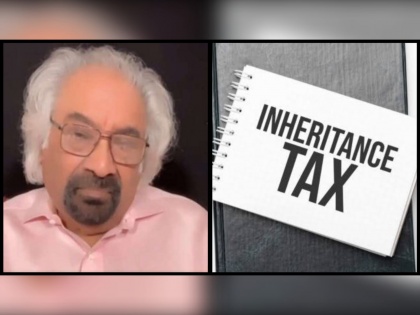Sam Pitroda Controversy: What Is Inheritance Tax, Which Countries Have It, And Why Is It Imposed?
By tejas1144 | Published: April 24, 2024 05:51 PM2024-04-24T17:51:14+5:302024-04-24T17:51:31+5:30
A new row erupted on Wednesday after Sam Pitroda, chairman of the Indian Overseas Congress, made remarks on inheritance ...

Sam Pitroda Controversy: What Is Inheritance Tax, Which Countries Have It, And Why Is It Imposed?
A new row erupted on Wednesday after Sam Pitroda, chairman of the Indian Overseas Congress, made remarks on inheritance tax in an interview. BJP leaders slammed Pitroda for his statements regarding wealth redistribution, particularly his reported endorsement of an inheritance tax legislation in the nation. Meanwhile, the Congress attempted to dissociate itself from his remarks, indicating that his opinions do not consistently align with the party's stance.
Pitroda has eventually come out to issue a clarification stating that neither did he advocate for inheritance tax in India, nor does Congress proposes it in its manifesto.
However, amidst this debate, many were unaware what exactly does an inheritance tax mean.
What is Inheritance Tax?
Inheritance tax is a tax levied on the estate (the total value of money and property) of a deceased person before the assets are passed on to their heirs or beneficiaries. It is essentially a tax on the transfer of wealth from one generation to another.
Countries with Inheritance Tax and Rates:
Inheritance tax laws vary widely across different countries. Some countries have high thresholds, exempting smaller estates from taxation, while others tax a portion of the estate regardless of its value. Here are a few examples:
1. United States: Instead of a nationwide inheritance tax, the U.S. has a federal estate tax, which applies to estates above a certain threshold (which can change annually). Additionally, some states impose their own estate or inheritance taxes.
2. United Kingdom: In the UK, inheritance tax is levied at a rate of 40% on estates valued above a certain threshold, which is £325,000 for individuals and £650,000 for married couples or civil partners as of 2022. There are also additional allowances and exemptions for certain assets and gifts.
3. France: France imposes inheritance tax on estates valued above €100,000, with rates ranging from 5% to 45% depending on the relationship between the deceased and the beneficiary.
4. Japan: Inheritance tax in Japan is imposed on estates valued above ¥30 million, with rates ranging from 10% to 55% depending on the size of the estate and the relationship between the deceased and the beneficiary.
Difference Between Inheritance Tax and Estate Tax:
While inheritance tax and estate tax are often used interchangeably, there is a subtle difference between the two:
Inheritance Tax: This tax is levied on the beneficiaries who receive the assets from the deceased's estate. The tax rate may vary based on the relationship between the deceased and the beneficiary and the value of the inheritance received.
Estate Tax: Estate tax, on the other hand, is imposed on the estate itself before it is distributed to the beneficiaries. The tax liability is calculated based on the total value of the estate, including assets, property, investments, and cash.
Why is Inheritance Tax Imposed?
The primary purpose of inheritance tax is to generate revenue for the government and promote social equality by redistributing wealth. By taxing the transfer of wealth between generations, governments can generate funds for public services and reduce wealth disparities within society. Additionally, inheritance tax can prevent the concentration of wealth within a small segment of the population, promoting economic fairness and social mobility.
Did India Have an Inheritance Tax?
Yes, India had an inheritance tax or estate tax, but it was abolished in 1985. In India, an inheritance tax was imposed on assets or property passed down to legal heirs following the owner's death, regardless of whether they were children or grandchildren. India does not currently enforce an inheritance tax, unlike several developed nations where such taxes remain active. The taxation system was abolished in 1985. Before its abolishment, the Estate Duty Act of 1953 required executors of the deceased's estate to pay a substantial "estate duty" of up to 85% of the value of the inherited property.
The Estate Duty Act was introduced in India in 1953 to address economic disparity by implementing an estate duty tax. This tax was designed to be progressive, with rates escalating to as high as 85 percent for estates valued above Rs 20 lakh. It covered both immovable and movable assets, regardless of their location, inherited by successors upon an individual's demise.
Is it the first time that the reintroduction of inheritance tax has been proposed since it was abolished?
No, demands for the reintroduction of inheritance tax have been consistent, especially considering the rise in wealth inequality in India post-liberalisation.
Despite BJP's attempts to target Congress over Pitroda's proposal, its own leader Jayant Sinha has advocated for inheritance tax in the past. Soon after assuming office in 2014, Jayant Sinha, the Minister of State for Finance, expressed support for bringing back the inheritance tax in some form. However, his proposal did not receive approval from Finance Minister Arun Jaitley and other BJP leaders.
There is no black and white when it comes to inheritance tax, and it requires a nuanced discussion rather than sweeping acceptance or rejection.
Open in app